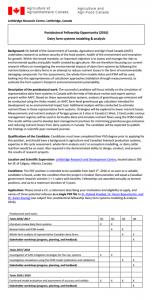Agriculture and Agri-Food Canada (AAFC) is offering a Postdoctoral Fellowship opportunity investigating the environmental impacts of dairy farm systems. A candidate is sought to monitor nutrient balance on dairy farms in an attempt to reduce nutrient losses in the form of environmentally damaging compounds, using the whole-farm models Holos and IFSM. The candidate must have a PhD and a background in agriculture and Canadian livestock production systems, expertise in life cycle assessment, whole-farm analysis and / or ecosystem modelling, or dairy cattle nutrition.
The PDF location is the Lethbridge Research and Development Centre in Canada, and the position is intended to commence on 1 April, 2016.
To apply, email (subject line “Postdoctoral fellowship dairy farm systems modelling & analysis 2016”). a single pdf file containing your CV, a statement describing your motivation and eligibility, and three referees to:
- Dr Roland Kroebel ([email protected])
- Dr. Karen Beauchemin ([email protected])
- Dr. Karen Koenig ([email protected])
Click here for more information

The Livestock Research Group held another successful meeting 19-20 February 2016, this time in Melbourne, Australia. A highlight of this year’s LRG meeting was a joint meeting with the newly formed Integrative Research Group (IRG), which will centre around a number of networks. The IRG was agreed at the GRA Council meeting in September 2015 as a merger of the previous Soil Carbon Nitrogen Cycling Group with the Inventories and Monitoring Group. The meeting was attended by Australia, Belgium, Brazil, Canada, Chile, Colombia, Denmark, France, Ghana, Indonesia, Ireland, Italy (via Skype), Japan, Lithuania, Malaysia, Netherlands, New Zealand, Philippines, Spain, Sri Lanka, Switzerland, Thailand, United Kingdom, USA and Vietnam, along with Tanzania, Uganda and other invited guests.
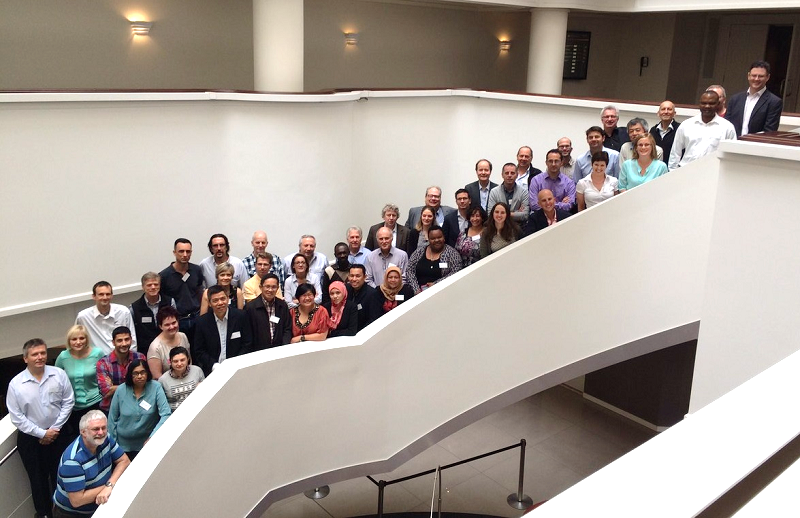
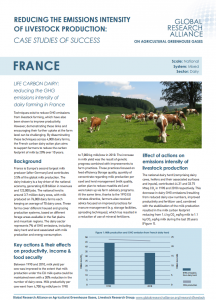 The Livestock Research Group has released a new case study in its series documenting countries’ on-farm successes in improving the productivity of livestock farming and reducing GHG emissions intensity. French dairy farmers made significant productivity gains between 1990 and 2010, which had a demonstrable impact on GHG emissions. A new ‘Life Carbon Dairy Action Plan’ is helping them continue to reduce the emissions intensity of milk production, and make other environmental gains, aiming for a reduction in milk’s carbon footprint of 20% over the next 10 years. Read the brochure here
The Livestock Research Group has released a new case study in its series documenting countries’ on-farm successes in improving the productivity of livestock farming and reducing GHG emissions intensity. French dairy farmers made significant productivity gains between 1990 and 2010, which had a demonstrable impact on GHG emissions. A new ‘Life Carbon Dairy Action Plan’ is helping them continue to reduce the emissions intensity of milk production, and make other environmental gains, aiming for a reduction in milk’s carbon footprint of 20% over the next 10 years. Read the brochure here
Reducing enteric methane for improving food security and livelihoods
A new brochure is now available on the collaborative project between the GRA and the FAO “reducing enteric methane for improving food security and livelihoods”. This project is identifying the best options to available to farmers now that can use to improve the productivity of their ruminant livestock and reduce the amount of enteric methane these animals produce.
Read the brochure to learn more about how this project is developing regionally appropriate packages of on-farm practices and interventions and understanding how these packages are best shared with farmers.
 Sweden’s EviEM has published a comprehensive database of all research from boreo-temperate ecosystems investigating the impacts of different agricultural management practices on soil organic carbon. Research covering a wide variety of different management practices, including soil amendments (such as lime addition, stubble retention, etc.), crop rotations, fertiliser application (organic and inorganic), and tillage (including reduced/conservation tillage and no tillage) has been categorised. The information has been published as a systematic map, comprised of a report describing the processes behind the review, a database of studies with columns of various descriptive information, and a geographical information system (GIS) that displays the database in an interactive cartographical map.
Sweden’s EviEM has published a comprehensive database of all research from boreo-temperate ecosystems investigating the impacts of different agricultural management practices on soil organic carbon. Research covering a wide variety of different management practices, including soil amendments (such as lime addition, stubble retention, etc.), crop rotations, fertiliser application (organic and inorganic), and tillage (including reduced/conservation tillage and no tillage) has been categorised. The information has been published as a systematic map, comprised of a report describing the processes behind the review, a database of studies with columns of various descriptive information, and a geographical information system (GIS) that displays the database in an interactive cartographical map.
Email Chair of Review Team ([email protected]) for more information
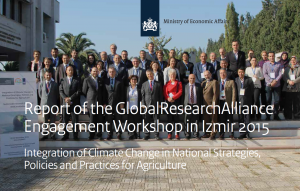 The workshop report for the regional GRA Engagement workshop held 18-19 November 2015 in Izmir, Turkey is now available to download. Participants gave enthusiastic reviews of the workshop, which familiarized non-member countries with the work and achievements of the GRA, created discussion opportunities on the key issues facing eastern Mediterranean and Central Asian countries with respect to agriculture and climate change, and explored further cooperation and GRA membership opportunities. The Turkish Ministry of Food, Agriculture and Livestock, the Dutch Ministry of Economic Affairs and the Embassy of the Kingdom of the Netherlands in Turkey, and the Global Research Alliance on Agricultural Greenhouse Gases were involved. Download the workshop report
The workshop report for the regional GRA Engagement workshop held 18-19 November 2015 in Izmir, Turkey is now available to download. Participants gave enthusiastic reviews of the workshop, which familiarized non-member countries with the work and achievements of the GRA, created discussion opportunities on the key issues facing eastern Mediterranean and Central Asian countries with respect to agriculture and climate change, and explored further cooperation and GRA membership opportunities. The Turkish Ministry of Food, Agriculture and Livestock, the Dutch Ministry of Economic Affairs and the Embassy of the Kingdom of the Netherlands in Turkey, and the Global Research Alliance on Agricultural Greenhouse Gases were involved. Download the workshop report
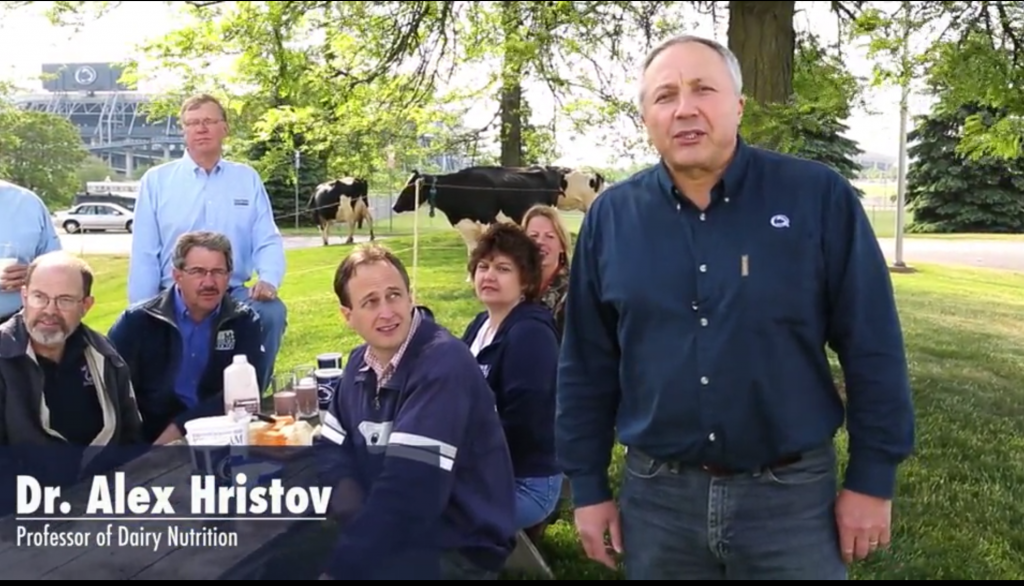 Faculty from Penn State’s Departments of Animal Science, Veterinary and Biomedical Sciences, Plant Sciences, and Agricultural Economics are developing the world’s first Dairy Production and Management MOOC (Massive Open Online Course). The course is designed to deliver fundamental knowledge and best practices related to sustainable dairy production systems in their broadest sense. Participants will gain a broad and comprehensive understanding of all aspects of dairy management including genetics, nutrition, reproduction, animal health, milk hygiene, farm economics, and sustainability of dairy production systems. There’s something in this course for everyone, whether you are just looking for the basics or have years of experience in the dairy industry. The course is launching March 7th, 2016. For more information and to register please visit the course’s website: https://www.coursera.org/
Faculty from Penn State’s Departments of Animal Science, Veterinary and Biomedical Sciences, Plant Sciences, and Agricultural Economics are developing the world’s first Dairy Production and Management MOOC (Massive Open Online Course). The course is designed to deliver fundamental knowledge and best practices related to sustainable dairy production systems in their broadest sense. Participants will gain a broad and comprehensive understanding of all aspects of dairy management including genetics, nutrition, reproduction, animal health, milk hygiene, farm economics, and sustainability of dairy production systems. There’s something in this course for everyone, whether you are just looking for the basics or have years of experience in the dairy industry. The course is launching March 7th, 2016. For more information and to register please visit the course’s website: https://www.coursera.org/
Download the latest version of the Livestock Research Group Newsletter
The December 2015 edition of the LRG newsletter is now available. The newsletter covers a recent livestock and greenhouse gas inventory workshop held in South-East Asia, includes an article from the CGIAR’s Climate Change Agriculture and Food Security programme sharing their views on the outcomes of the recent international climate change negotiations. Also covered are project summaries from research fellows from Uganda and Denmark.
The Newsletter also includes further details about the 8th LRG meeting to be held in Melbourne, Australia alongside the Greenhouse Gas and Animal Agriculture Conference in February 2016 – download the Newsletter for more information!
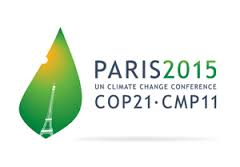 This week marks the ending of the 2016 Conference of Parties (COP21) in Paris, France, where 195 countries made a legally binding agreement to keep a global temperature rise this century well below 2 degrees Celsius, and to limit the temperature increase even further to 1.5 degrees Celsius above pre-industrial levels. See the agreement
This week marks the ending of the 2016 Conference of Parties (COP21) in Paris, France, where 195 countries made a legally binding agreement to keep a global temperature rise this century well below 2 degrees Celsius, and to limit the temperature increase even further to 1.5 degrees Celsius above pre-industrial levels. See the agreement
Other outcomes of specific interest for the GRA include:
- The launch of the 4/1000 Initiative, which aims to increase carbon stocks in agricultural soils (notably grasslands and pastures) and forest soils by 4/1000 per year of the soil carbon stock to improve soil fertility and farm resilience. Get involved
- The Climate & Clean Air Coalition (CCAC)’s meeting, where it launched a 5-year scientifically-based policy strategy to substantially reduce emissions of black carbon, methane, tropospheric ozone and HFCs. See more
- New Zealand’s announcement that it will invest an additional $20 million NZD towards the GRA over the next four years. See official media release


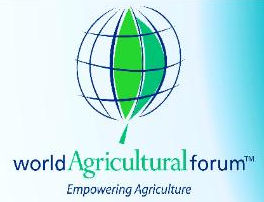 The Global Research Alliance on Agricultural Greenhouse Gases is pleased to announce some new partnerships.
The Global Research Alliance on Agricultural Greenhouse Gases is pleased to announce some new partnerships.
The GRA welcomes the World Agricultural Forum (WAF) as a Partner. The GRA has previously been involved in WAF’s 2013 Congress in India. The GRA also welcomes as a Partner the Centre for Agriculture and Bioscience (CABI), which has been involved in GRA Research Group meetings. We are looking forward to making the most of these partnerships.
The GRA has also invited to partner with the Climate and Clean Air Coalition (CCAC). The CACC has already collaborated with the GRA through the LRG’s Manure Management Research Network and through the PRRG / IRRI / CIAT methane emissions project.
For more information about these partners, please click on the links below.
The CGIAR Research Program on Climate Change, Agriculture and Food Security (CCAFS) has published a new analysis of what COP21 means for food and farming, and what the next steps should be between now and 2020 when the Paris Agreement comes into force.
The analysis picks up the theme that “Voluntary cooperation” between countries, including through technology transfer and capacity building, is a major focus that comes through in the Agreement as is the need for all countries to support science and research.
Read the CCAFS info note: The Paris Climate Agreement: what it means for food and farming http://bit.ly/1UpvXws.
And for more information on research highlights visit CCAFS website: Paris Climate Agreement unlocks opportunities for food and farming http://bit.ly/1NsY1u9.
Out Now – UK Agri-Science & Innovation Newsletter Issue 4, supporting international actions to mitigate agricultural greenhouse gas emissions.
The October 2015 newsletter covering UK activities to support the GRA covers the launch of the Global Research Alliance Modelling Platform (GRAMP) website, recent meeting of the Livestock Research Group Networks in the UK and the completion of a survey by GRA member countries regarding the use of earth observation to provide agricultural activity data for inventory compilation.
Previous issues of the newsletter and more information on UK GRA activities can be found on the UK country page.

